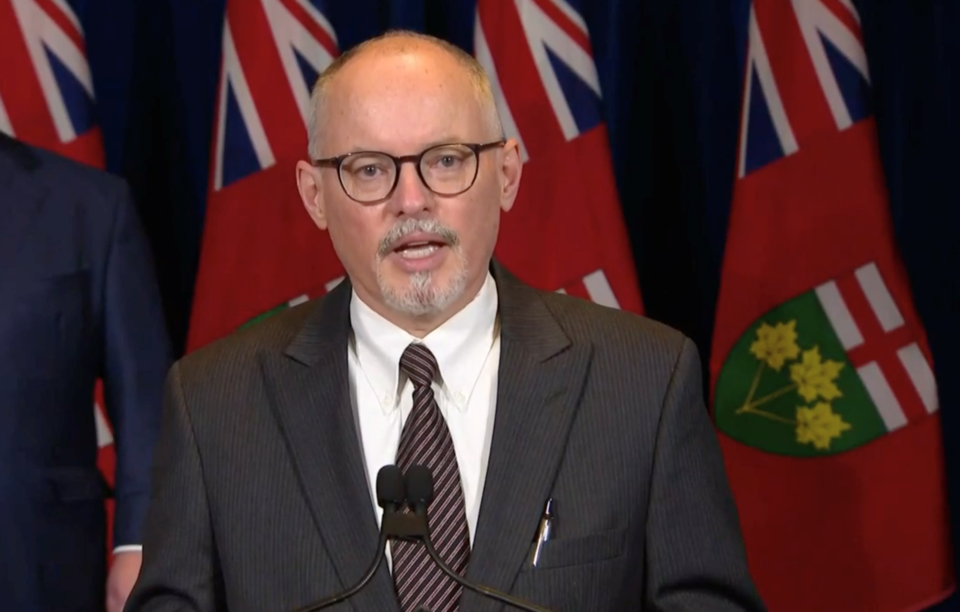TORONTO — Ontario is trying to ascertain "true" mortality data from COVID-19 by telling hospitals to document whether deaths were caused by or associated with the virus, the province's top doctor said Thursday.
The province recently started reporting whether COVID-19 hospitalizations were people admitted "for" the virus or "with" the virus, and the chief medical officer of health said he wants to see that type of mortality data, too.
"It may be that some of these deaths are incidentally correlated to COVID-19," Dr. Kieran Moore said.
He has recently met with the chief coroner's office and will be sending memos to hospitals "to ensure that death is documented appropriately, if it's associated with or caused by COVID-19, to further clarify, for the public, the cause of death."
Ontario has been reporting relatively high numbers of COVID-19 deaths this month -- double digits each day since Jan. 4, including two days with more than 40 new deaths reported.
Moore said health officials are trying to understand what is behind the large numbers, but that many deaths will be due to the previous wave of Delta, a COVID-19 variant with a higher virulence, and some will be attributed to Omicron — shown to be less severe — because there are so many more cases.
Dr. Peter Juni, the scientific director of Ontario's COVID-19 Science Advisory Table, said it could be "quite challenging" to determine the role a COVID-19 infection played in someone's death given the current strain on health resources and the nature of the illness itself.
"One of the challenging things with COVID is that it affects a great many organ systems, so it's very difficult ... to understand whether COVID actually played the role or not," he said, adding that the assessment would have to happen relatively soon after the person's death.
If a cause of death is unclear, "we would need to assume that COVID-19 is actually involved," he said, especially given the current pandemic situation in Ontario.
Juni also said that he doesn't expect the number of incidental COVID-19 deaths to be very large.
With so many Ontarians infectious with Omicron at the moment -- a percentage Juni pegged at roughly between 10 to 15 per cent of the population -- he said hospitals are seeing high levels of community spread reflected in admissions, meaning people are testing positive after coming in for other reasons. However, he said that appears to be less common with more severe outcomes of the disease.
"What we're seeing is that the more severe the outcome, the smaller this percentage is that is considered incidental," he said. "I would personally assume that the incidental diagnosis of COVID in patients who die will be ... relatively small."
The province reported 35 new deaths Thursday from the virus.
Ontario reported 3,630 people in hospital Thursday due to COVID-19, and 500 people in ICU — an increase in hospitalizations from 3,448 people the previous day, and five fewer people in intensive care units.
Moore said he anticipates Omicron will peak in Ontario in the next few weeks, predicting a difficult rest of the month followed by a better February and March.
He also announced that immunocompromised Ontarians can book appointments for a fourth dose of a COVID-19 vaccine starting Friday.
The province has already started giving out fourth doses in long-term care homes, retirement homes and other congregate settings, and Moore said in order to further protect vulnerable populations, people who are moderately to severely immunocompromised can book a fourth dose starting at 8 a.m. Friday through the provincial vaccine contact centre.
Meanwhile, Moore said transplant patients are lagging in receiving their third doses, with only about 64 per cent of them having done so. For transplant patients, three doses is considered the primary series, Moore said, with a fourth dose acting as the booster.
Provincial data show 82 per cent of Ontarians aged five and older have received two doses of a COVID-19 vaccine and 88 per cent have at least one dose.
This report by The Canadian Press was first published Jan. 13, 2022.
Allison Jones and Holly McKenzie-Sutter, The Canadian Press
